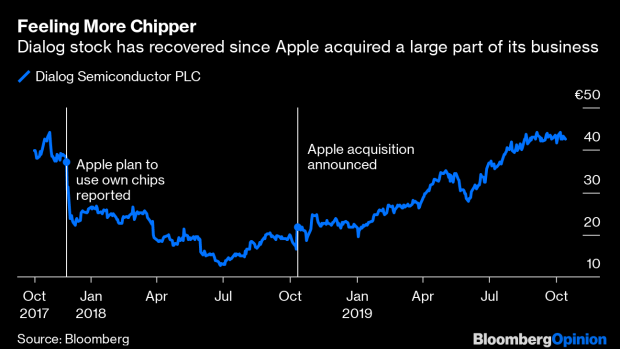Oct 17, 2019
How to Survive an iPhone Disaster
, Bloomberg News

(Bloomberg Opinion) -- Apple Inc.’s suppliers have walked a tightrope for a long time.
They try very hard to get their products into the iPhone because it can mean a massive increase in sales. But they must proceed with care, as doing so risks yoking their business to the whims of the Silicon Valley giant’s famously capricious supply chain operations. When iPhone sales stutter, Apple reacts by trying to squeeze even lower prices out of suppliers. Worse, it starts to make the components itself.
That’s why it looked like horrible news for Dialog Semiconductor Plc when it became clear two years ago that Apple was going to produce its own power-management chips (which regulate how energy is distributed around a device) for its iPhone, rather than buying them from the British tech company. But Dialog has managed the transition well. The stock has risen more than three-fold from a 2018 low.
Adding to the ignominy at the time, Apple paid what looked like a bargain $300 million last October to take on 300 of Dialog’s engineers, and pledged a further $300 million to buy Dialog components over three years to help its transition out of the iPhone supplier stable. A year later, though, and the terms of that deal look like a canny piece of business for Dialog’s chief executive officer Jalal Bagherli.
While Dialog would no doubt have preferred to retain the status quo, where 75% of its revenue came from Apple (almost all from iPhone components), that made it particularly vulnerable to being squeezed on prices.
The share price recovery this year has only brought Dialog back to where it was before Apple’s decision to drop it as an iPhone supplier. But it secured three years of guaranteed revenue, without the cost of employing the engineers responsible for generating much of it (since they’ve now joined Apple).
The British company is pivoting meanwhile to supply consumer and industrial products with a healthier growth trajectory than the iPhone, such as Apple’s AirPods and Macs. Yes, they’re still Apple products but there’s less pressure on supplier margins. Plus Dialog wants Apple to account for less than 40% of its revenue by 2022.
This does all point too to a softening by Apple toward its suppliers, particularly those making components not easily found elsewhere. In July, Bloomberg News reported that it had pledged $100 million to keep afloat the troubled Japan Display Inc., a maker of iPhone screens. That followed an $850 million payment to Samsung Electronics Co. to make up for a shortfall in purchases of organic light-emitting diode displays.
The driver of Apple’s changed behavior is surely the fierce competition in smartphones, where its market share has declined. The company’s ability to strong-arm suppliers into giving it better terms in return for stratospheric sales growth is therefore waning. If Apple’s going to retain access to cutting-edge components, suppliers must know they won’t be cut adrift.
To contact the author of this story: Alex Webb at awebb25@bloomberg.net
To contact the editor responsible for this story: James Boxell at jboxell@bloomberg.net
This column does not necessarily reflect the opinion of the editorial board or Bloomberg LP and its owners.
Alex Webb is a Bloomberg Opinion columnist covering Europe's technology, media and communications industries. He previously covered Apple and other technology companies for Bloomberg News in San Francisco.
©2019 Bloomberg L.P.





